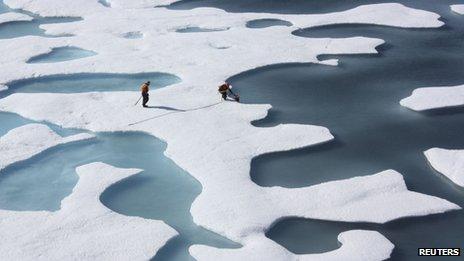Rio+20: Sir Paul backs Greenpeace Arctic campaign
- Published

Campaigners want environmentally damaging activities in the Arctic to end
Greenpeace is launching a campaign to have the Arctic region declared a sanctuary by the United Nations.
The group aims for a million signatures on a petition calling for an end to oil exploration and unsustainable fishing, which will be planted on the sea bed.
Celebrities such as Sir Paul McCartney, actor Robert Redford and the boy band One Direction are among the backers.
The move comes as a response to what the environment group regards as the "epic failure" of the Rio+20 summit.
'War footing'
The summit aimed to put the global economy on a more sustainable footing - enhancing economic wealth, especially for the poorest on earth, while protecting the environment.
But environment groups are bitterly disappointed that governments have chosen not to press forward on issues such as ending fossil fuel subsidies, enhancing energy efficiency and espousing the idea of a "green economy".
"The fightback starts here," said Kumi Naidoo, executive director of Greenpeace International.
"The Arctic is coming under assault, and needs people from around the world to stand up and demand action to protect it.
"A ban on offshore oil drilling and unsustainable fishing would be a huge victory against the forces ranged against this precious region and the four million people who live there."
Mr Naidoo, who previously campaigned to end apartheid in his native South Africa, told the Guardian newspaper on the fringes of the Rio+20 summit that Greenpeace was moving to a "war footing" as a result of the Rio outcome.
The first 100 signatories on the new petition include explorers, business leaders, actors and musicians.
'Madness'
Film director Pedro Almodovar and his sometime leading lady Penelope Cruz, Radiohead frontman Thom Yorke, actor Javier Bardem and businessman Sir Richard Branson are on the list unveiled at Rio+20.
"It seems madness that we are willing to go to the ends of the earth to find the last drops of oil when our best scientific minds are telling us we need to get off fossil fuels to give our children a future," said Sir Paul.
"At some time, in some place, we need to take a stand. I believe that time is now and that place is the Arctic."
Thom Yorke added: "An oil spill in the Arctic would devastate this region of breathtaking beauty, while burning that oil will only add to the biggest problem we all face, climate change."
Another signatory, Xena and Battlestar Galactica actress Lucy Lawless, is due to be sentenced in September for blocking operations on a Shell oil rig in the Arctic earlier this year.
The Arctic is warming up faster than almost any other part of the planet.
The area of ocean covered by sea ice each summer is shrinking. If current trends continue, it will set a new record low for the satellite era this year.
As the sea ice recedes, it becomes easier for companies to prospect for oil and gas, with the US, Canada, Greenland and Russia among countries pursuing this nascent industry.
Greenpeace is calling for an agreement to ban environmentally damaging activities in the Arctic region, just as they were banned in the Antarctic 21 years ago under a protocol added to the Antarctic Treaty.
It is not the first organisation to call for such an agreement. Proposals date back to the 1970s, but have never gained political traction.
In 2007, acting under instruction from Moscow, explorer Artur Chilingarov planted a Russian flag on the seabed beneath the pole, laying claim to the area.
The Greenpeace action aims to counteract that by planting a scroll signed by at least a million people in the same place, claiming it as a sanctuary.
Follow Richard <link> <caption>on Twitter</caption> <url href="http://twitter.com/#!/BBCRBlack" platform="highweb"/> </link>

- What is the Rio summit about?







- Published21 June 2012
- Published20 June 2012
- Published19 June 2012
- Published17 June 2012
- Published16 June 2012
- Published15 June 2012
- Published14 June 2012
- Published13 June 2012
- Published12 June 2012